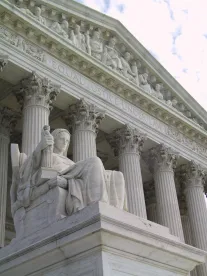The Supreme Court of the United States issued a unanimous opinion in Standard Fire Insurance Co. v. Knowles, interpreting the Class Action Fairness Act (CAFA) for the first time since it was enacted in February 2005. Specifically, the Court held that, prior to certification, a named plaintiff’s “stipulation” that putative class members would not seek more than $5 million in damages cannot defeat jurisdiction under CAFA. A copy of the decision is available here.
CAFA gives federal courts original jurisdiction over class actions if (among other things) “the matter in controversy exceeds the sum or value of $5,000,000, exclusive of interest and costs.” 28 U.S.C. § 1332(d)(2). To determine the amount in controversy, “the claims of the individual class members shall be aggregated.” Id. § 1332(d)(6). The term “class members” encompasses “the persons (named or unnamed) who fall within the definition of the proposed or certified class.” Id. § 1332(d)(1)(D).
In Knowles, the plaintiff filed a putative class action that claimed that Standard Fire had underpaid claims for loss or damage to real property pursuant to homeowners’ policies because it had not covered the costs of hiring a general contractor. He sought to represent a class of “hundreds, and possibly thousands” of Arkansas policyholders who suffered similar damages. His complaint stated that the “Plaintiff and Class stipulate that they will seek to recover total aggregate damages of less than five million dollars” and attached a stipulation in which he stated that he “will not at any time during this case ... seek damages for the class ... in excess of $5,000,000 in the aggregate.”
Standard Fire removed the action to federal court under CAFA and Knowles moved to remand. The district court found that the amount in controversy would exceed $5,000,000 were it not for the stipulation. It remanded the case, however, finding that the stipulation defeated jurisdiction. Standard Fire then petitioned for permission to appeal, which the Eighth Circuit denied, and finally petitioned for certiorari, which the Supreme Court granted.
Today, the Supreme Court unanimously vacated the district court’s remand order.
The Court acknowledged that individual plaintiffs are deemed the “masters of their complaints” but reasoned that “the key characteristic” of an individual plaintiff’s stipulation is that it is “legally binding.” That was not the case here, though, because named plaintiffs do not have authority to “stipulate” on behalf of unnamed plaintiffs until after certification is granted:
Stipulations must be binding…. The stipulation Knowles proffered to the District Court, however, does not speak for those he purports to represent. That is because a plaintiff who files a proposed class action cannot legally bind members of the proposed class before the class is certified. Because his precertification stipulation does not bind anyone but himself, Knowles has not reduced the value of the putative class members’ claims. For jurisdictional purposes, our inquiry is limited to examining the case ‘as of the time it was filed in state court.’ At that point, Knowles lacked the authority to concede the amount-in-controversy issue for the absent class members.
Opinion at 3-4 (citations omitted).
The Court also recognized that adopting a contrary rule might make things “simpler” and that, “when judges must decide jurisdictional matters, simplicity is a virtue.” Id. at 6. It declined to do so, however, finding that a contrary rule would “exalt form over substance, and run directly counter to CAFA’s primary objective: ensuring ‘Federal court consideration of interstate cases of national importance.” Id. It would also “have the effect of allowing the subdivision of a $100 million action into 21 just-below-$5-million state-court actions simply by including nonbinding stipulations,” which would “squarely conflict with the statute’s objective.” Id.
The decision roundly rejects attempts to avoid CAFA by stipulating away unnamed plaintiffs’ damages or gerrymandering class definitions, will likely result in a flurry of re-removals in courts where such tactics had previously been effective, see Rolwing v. Nestle Holdings, Inc., 666 F.3d 1069 (8th Cir. 2012), and may well inform future decisions concerning the propriety of pre-certification communications with unnamed plaintiffs.




 />i
/>i

